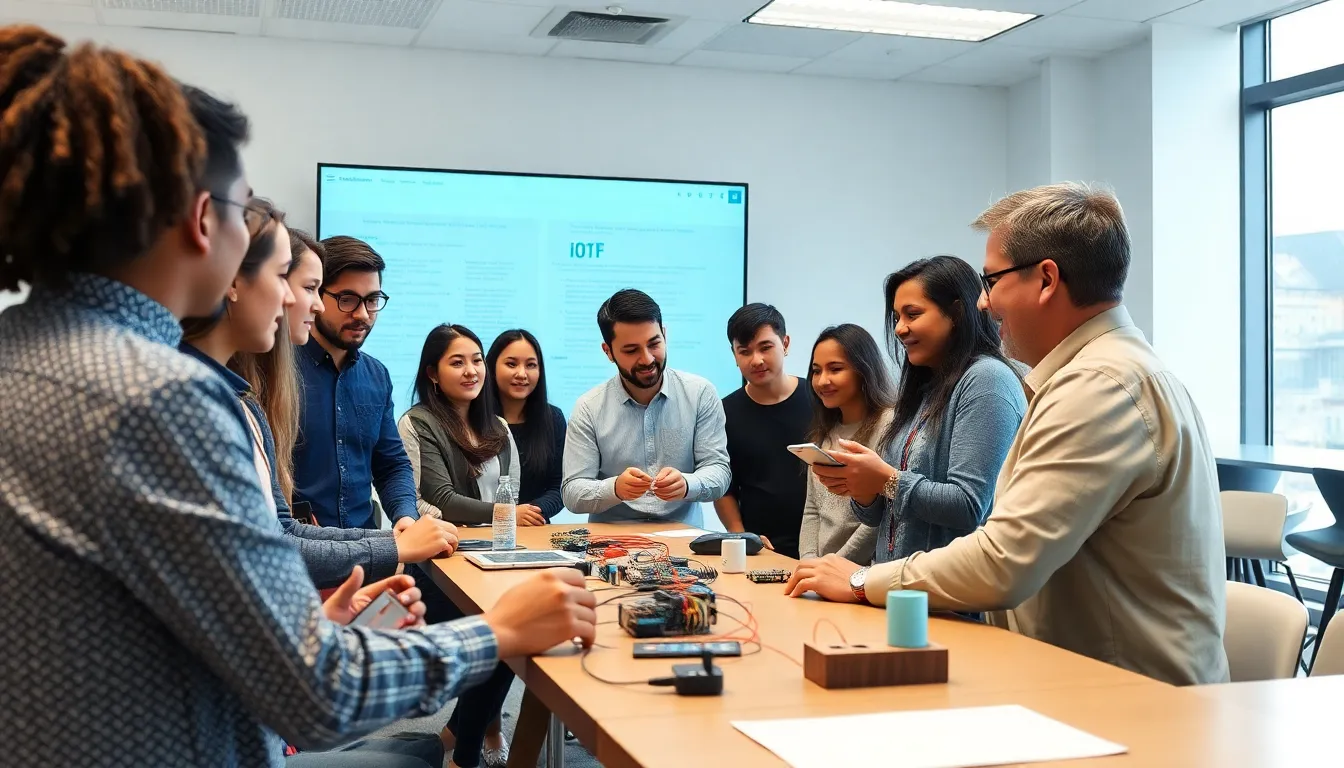In a world where your fridge can remind you to buy milk and your thermostat knows when you’re feeling chilly, the Internet of Things (IoT) is no longer just a sci-fi dream. It’s a reality that’s reshaping industries and making everyday life a little smarter. But how does one dive into this tech wonderland? Enter IoT courses, the golden ticket for anyone looking to unlock the secrets of connected devices.
iot courses
IoT courses provide essential knowledge for exploring the interconnected world of smart devices. Various educational platforms offer these courses, catering to all levels of expertise, from beginners to advanced learners. Participants gain insights into IoT architecture, protocols, and hardware components crucial for developing and implementing IoT solutions.
Course content often includes practical exercises that allow students to gain hands-on experience with IoT technology. Topics such as cloud computing, data analytics, and cybersecurity also feature prominently in many IoT programs. Online courses enable flexibility, allowing learners to progress at their own pace.
Industry-driven courses include real-world projects, facilitating a deeper understanding of challenges faced in IoT deployments. Furthermore, partnerships with tech companies enhance the curriculum, ensuring students receive up-to-date information and tools. Certificates from recognized institutions often accompany successfully completed courses, bolstering career prospects.
Additionally, IoT specializations focus on specific applications, such as smart homes, healthcare, and industrial IoT. These targeted programs equip learners with niche skills, making them valuable in the job market. Many individuals pursuing a career in IoT find that comprehensive courses promote collaboration and networking opportunities among peers and professionals.
Selecting the right IoT course hinges on personal goals, desired applications, and budget. Researching course reviews and outcomes can inform decisions, ensuring alignment with career ambitions. Ultimately, IoT courses serve as a foundation for mastering the complexities of this rapidly evolving field.
Types Of IoT Courses

Individuals seeking to dive into the world of IoT can choose from various course formats tailored to their needs and preferences.
Online Courses
Many platforms offer online courses that provide flexible learning opportunities. Learners set their own pace and access a wide range of topics. Whether focusing on IoT fundamentals or advanced concepts, online options cater to different expertise levels. Courses often feature interactive modules that include quizzes and hands-on projects. Popular platforms like Coursera, edX, and Udacity partner with top universities and companies for content. Additionally, many programs provide certificates that enhance resumes and career prospects.
In-Person Workshops
In-person workshops provide a hands-on approach and interactive learning environment. Participants benefit from direct access to experienced instructors and the opportunity for networking. Typically hosted by tech companies or educational institutions, these workshops emphasize practical skills and real-world applications. Sessions often involve group projects that simulate actual IoT scenarios. Such immersive experiences allow attendees to ask questions in real-time and receive immediate feedback. Many workshops also offer specialized tracks, focusing on areas like smart cities or industrial IoT.
Key Skills Learned In IoT Courses
IoT courses empower participants with essential skills required for navigating the Internet of Things landscape. Learners gain practical expertise in several critical areas.
Programming
Proficiency in programming languages forms a foundation for IoT development. Languages such as Python, Java, and C++ are often emphasized, allowing individuals to create applications that interact with connected devices. Understanding syntax and frameworks helps streamline the coding process. Moreover, students engage in real-world projects that reinforce coding concepts. Building simple applications enhances problem-solving skills, making the programming component indispensable for effective IoT solutions.
Networking
Networking skills are vital for managing interconnected devices. Course participants explore networking fundamentals, including protocols like MQTT and HTTP essential for communication between devices. Knowledge of TCP/IP and local area networks also plays a crucial role in ensuring device reliability. Hands-on labs provide valuable experience in setting up and troubleshooting networks. Mastery of these concepts allows individuals to design more efficient IoT systems that can optimize data flow and connectivity.
Data Analysis
Data analysis techniques are critical for extracting insights from IoT-generated data. Participants learn statistical methods and analytics tools that handle large data sets effectively. Familiarity with data visualization platforms enhances the ability to present findings meaningfully. Through practical exercises, individuals analyze real-time data to make informed decisions. Developing these analytical skills equips learners to leverage IoT data for actionable business strategies, driving innovation across industries.
Factors To Consider When Choosing An IoT Course
Selecting the ideal IoT course involves multiple important factors. Course content plays a crucial role in shaping learners’ knowledge and skills. Engaging modules should cover IoT architecture, protocols, and real-world applications. Practical exercises enhance understanding, ensuring learners gain hands-on experience relevant to current industry standards. It’s essential to find a course that balances theory and practice effectively.
Instructor expertise significantly influences the learning experience. Qualified instructors bring real-world experience, providing valuable insights and practical knowledge. They should possess strong backgrounds in IoT technologies and related fields. Access to experienced educators encourages learners to ask questions and deepen their understanding of complex concepts.
Certification value is another key consideration. Recognized credentials can enhance career opportunities and demonstrate competency in the IoT field. Many employers prioritize candidates with industry-backed certifications. Selecting a course that offers a reputable certification can provide a competitive edge in the job market and instill confidence in learners’ abilities.
Conclusion
Embracing IoT courses is a strategic move for anyone looking to thrive in a technology-driven world. These programs not only provide foundational knowledge but also equip learners with practical skills essential for real-world applications. With the flexibility of online options and the hands-on experience offered by in-person workshops, there’s a suitable path for every aspiring IoT professional.
As industries increasingly rely on interconnected devices, the demand for skilled individuals continues to grow. Investing time in these courses can lead to enhanced career prospects and specialized knowledge tailored to specific interests. By choosing the right IoT course, individuals can position themselves at the forefront of this exciting and rapidly evolving field.

